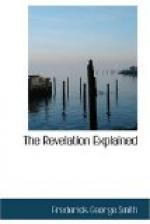By “the sea” into which this burning mountain was cast is meant, not the Mediterranean nor any other literal sea, but the heart of the empire, and that in a state of agitation. The empire was in a state of comparative quiet when Alaric appeared; therefore the storm of hail and fire is represented as falling upon “the earth,” as a result of which society was thrown into a state of great agitation, and moved to its depths, like an ocean in a storm. This was its condition when Genseric, from his fixed position in Africa, began his desolating incursions; therefore the next symbol is that of a mountain cast into “the sea.” By the sea becoming blood is doubtless meant the destruction of life in the empire, and “the third part” denotes the vast extent of the destruction.
I must speak with hesitation on what is signified by “the creatures which were in the sea” and the “ships.” By analogy I would be led to refer the former to the rulers and the dignitaries in the empire, they bearing an analagous position to the empire that fishes do to the waters of the sea; while the latter may refer to public monuments and structures.
10. And the third angel
sounded, and there fell a great star
from heaven, burning as it
were a lamp, and it fell upon the
third part of the rivers,
and upon the fountains of waters;
11. And the name of the
star is called Wormwood: and the third
part of the waters became
wormwood; and many men died of the
waters, because they were
made bitter.
The description given of this star is similar to that of a large burning meteor, such as we frequently see shooting athwart the heavens. It fell rapidly to earth, as such meteors often do, and struck the fountain-heads of the rivers, imparting to them such a poisonous quality as caused the death of those who drank the waters.
This symbol is also drawn from the natural world, and hence we must look for its fulfilment in political events. The rapidity of its fall and disappearance in the waters would direct us to an agent who would appear suddenly and soon disappear, and whose career would leave bitter results. The direct effects of this meteor were experienced by the rivers and the fountains of waters, which bear an analagous relation to the sea that bordering tribes and nations do to an empire. The heart of the empire, or “the sea,” was directly affected by the burning mountain, under the preceding trumpet; while the tributaries of the sea, or the bordering tribes, are made the subject of direct attack under this symbol and the poisonous qualities of their waters carried to far distant points.




